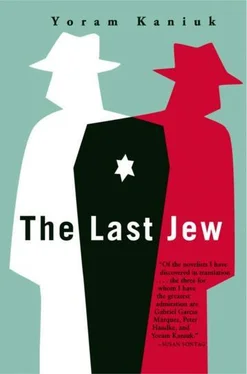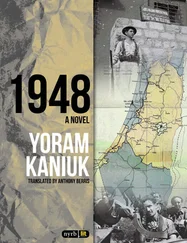The rabbi of the nearby settlement was now beginning to enjoy coming to the settlement. He knew that here, God was the one Rebecca Schneerson conspired with, but he no longer had enough strength to fight the war of the Lord. A late spring would grant the settlement more spring than the nearby settlements. Old Horowitz told the journalist who came to interview him that the marvelous sculptures of Ebenezer, who was almost Boaz's father, were the most beautiful artistic creations he had ever seen. The aphorism about Ebenezer on the wall of the community center was contributed by the Captain. The farmers helped Boaz overcome the enmity of the children. The yearning looks of the girls he learned to accept as he had to accept his grandmother's Psalms or the mysterious whispers of Mr. Klomin and the Captain about the national-royal party. They still plotted stratagems. Every Wednesday, the Captain still asked for Rebecca's hand and got a negative reply. There was no reply from the British crown even after five letters of five hundred pages each. That was the great imminent war that granted Mr. Klomin the possibility of preparing an innovative strategy, using a short-range tactic to solve the problem of British rule. The royalist party won the settlement (with the Captain's modest support) a contract to sell citrus fruit to the British army, whose troops increased. The best agricultural deal since the beginning of the Jewish Yishuv in the Land was buying the land for a big airport. At a time when the rumor spread that the settlement was infected with the disease of death and old people were dying at the rate of one a week, the sons of the founders, with the aging Captain as agent, sold lands at an exorbitant price to build an airport. Some of the founders were fictitious in any case, and so only the local historians were interested in bearing witness to the disease of death, especially since the price yielded such great wealth. At the eulogy of old Horowitz, who wept at the sight of Nehemiah dancing with Nathan on the day he came to the settlement forty years before and followed Ebenezer when he returned Dana's body, it was said of him that he was a Pioneer not only of Hebrew agriculture in the Land, but also of aviation in the Land of Israel. From here, said Principal All's Well, the airplanes of Judah will fly to strike the enemies of the Lord. A third of the land for the new field, whose airplanes Horowitz prophesied, according to his eulogy, belonged to Rebecca. While Ebenezer was wandering from Poland to eastern Ukraine and to Russia and from there to the camps, Boaz and the other children of the settlement were working to build a new airport. The adult workers learned to appreciate his silence and the quality of his work. Boaz was then thirteen years old, strong with a solid body, and after only two weeks he was appointed supervisor of the work of his older comrades and his salary was raised. That, of course, was without any connection to his special relations with Captain Jose Menkin A. Goldenberg, whom the British discovered was a great air force expert. Boaz didn't ask how the Captain or even Colonel (for he was promoted), who had never fought in any war that anybody had ever heard of, knew how to build airfields. But when he saw how the field was built and the planes started landing, and even more marvelous, taking off, and how satisfied the British were with the field, the row of concrete antitank structures, the way of sheltering airplanes against an air raid, and building decoys to mislead the enemy, Boaz said to himself: What's to ask, maybe in Argentina they fought with airplanes in the last century. But he wasn't even sure the Captain came from Argentina. The British looked at Boaz and said: He's clever like all the Jews, and he laughed. His yellow-green eyes caused incomprehensible excitement among the officers' wives, who sat around a lot in chaise longues topped with parasols held by Arabs from Marar and looked at him. They didn't know he was building a future airfield for Mr. Klomin's royalist party. They would look at him excitedly, giggle, long for children in their wombs, and didn't know it. They were too delicate to express what every one of the children of the settlement understood; but Boaz didn't care.
He walked around among the intersection of the looks of the English women who drank cold juice, as Rebecca said later, as beautiful angels walk around at the entrance to Paradise and try to bribe the gods with their beautiful eyes. She took that sentence, although she messed it up a bit, from a description of Joseph Rayna, who she knew sometimes was Boaz's father. Where could such a resemblance between them come from? she asked herself with a pain she didn't reveal to anybody, not even Boaz, how can it be that Joseph Rayna and Boaz Schneerson were one person born at different times?
At least he doesn't fall in love with those women, she said to herself, at least he doesn't get ugly women pregnant. And then she clapped her hands and Ahbed, the grandson of Ahbed, brought her a cup of tea.
After twelve months of war, in 'forty-eight, after he wandered around for a while and didn't know how long, he met somebody who was his double. He took a fake gold ring off the finger of Minna, the building contractor's daughter, and came to the settlement. Autumn made the descending evening silent and dangerous. The threshing floor wasn't there anymore. Instead of the threshing floor was the big house surrounded by a garden. A black DeSoto was parked next to the house. He thought of the chicks of the kindergarten teacher Eve that had died so they could build a new house here with a DeSoto. He recalled the car he had stopped in Tel Aviv, and thought maybe he shouldn't have banged the heads of those two people together. A woman wrapped in a shawl stood in the glow of evening and pruned a rosebush. In that soft, splendid hour she looked like a firefly. The light glowed on her, flitted and returned. Somebody inside the house was playing with a flashlight. She stood out against the background of the summer ground that had drunk the first rains of the season that morning. On the way, in the bus, he saw two Arabs in the field. The sight of them calmed him. They weren't an enemy he had to shoot at.
The Arabs in the field allowed him to think of Rebecca. They were sheikhs; planted in the landscape like scarecrows, cut out of it, without challenge, without the affection or longing of All's Well her husband or Eve whose chicks didn't all return and some were buried in Roots to her husband's florid speeches. The Arabs in the field were domesticated in it. Nor did he resent it, because he thought about his grandfather Nehemiah who couldn't be like them. I'm the wrong man who returned from the war, he thought, and it's her fault! No threshing floor, no Menashe, no Menahem Henkin, no double, no redhead, in the end there's me. On the porches, in the chill evening wind, sit the old women, Grandmother will bury them all and when my turn comes, she'll bury me too. And then she'll go back to Joseph Rayna somewhere in the green moss at the end of the solar system.
He saw children at the bougainvillea bush and thought about a little girl he had once known. They spawn like fish, produce Hebrew soldiers in an assembly line for Eve the kindergarten teacher. I've come back without your chicks, Eve! The soldiers died for you, proudly they carried to their graves the exalted words you instilled in them. Did that help them? So you've got a flag! In the bus, a woman sat next to him and read a magazine. She wore a purple dress and her lips were painted. She didn't know that Marar no longer exists, she didn't even know there ever was a village here named Marar. She read indifferently about the homemade ink flag hoisted in Eilat. The picture shows a person climbing a pole and hanging an improvised flag. The Arabs don't draw flags with ink, Marar was destroyed, they killed Menahem and they go on plowing. The woman in the bus smiled at him. What? Marar? You didn't know, new in the Land, you lived in Beersheba, a new housing project, in the war, it was bad. She talked about another war when Ebenezer died and we built an airfield for the British. A radio is open to the evening, the old women sit listening to music, the wind blows silently, the trees move in restrained splendor, the old women don't recognize Boaz, they don't know that Ebenezer's son brought them the state. Boaz returned intact, not wounded, no woman stood up for him in the bus. All's Well won't make a speech for me, he thought bitterly, no flag will wave, no enemy will be arrested for my dead body. That "togetherness," which started in Eve's kindergarten and continued in the threshing floor when they all sang "there was a young woman at Kinnereth" and I sat on the side, I prepared the next wars with Jose Menkin A. Goldenberg. I helped him woo Rebecca. I told him how she looked without a bra and without panties, and he blushed. He clutched a sword he no longer wore belted at his side, stood gazing, the girls sang about the threshing floor, and I sang and didn't sing. The truth is that what oppressed him most was that he couldn't get killed. I have nothing to come back to, he said to himself, and those who did have where to come back to and what to come back to, didn't return. That's not glory, Eve.
Читать дальше












